The trail headed right out the middle of town, south. No hassles with hitching or combustion engines. There was something about that lack of needing a vehicle, something that made the trail more pure. I was only walking, that was all. I walked straight out of the place that people had shaped, and straight into that they had not. I touched every step in-between.
The trail wound around the shore of two huge lakes south of Grand Lake. The lakes were dammed, man-made. Dammed lakes never looked quite right, they looked forced, faked. Natural lakes usually sat like puddles at the bottom of big valleys – the slope of the terrain gradually leveling to the water. The man-made lakes took the place of the valley entirely – the steep regular mountainsides were interrupted by the water, covering what was supposed to be below. On the second lake, the water level was about 20 feet low – a band of smooth white deadness led down to the trapped water. The trail was nice though – 8 miles of walking along the water went quickly. The trail rose to a ridge, where I had a higher view of yet another lake below. But, my attention was focused on the mountains beyond.
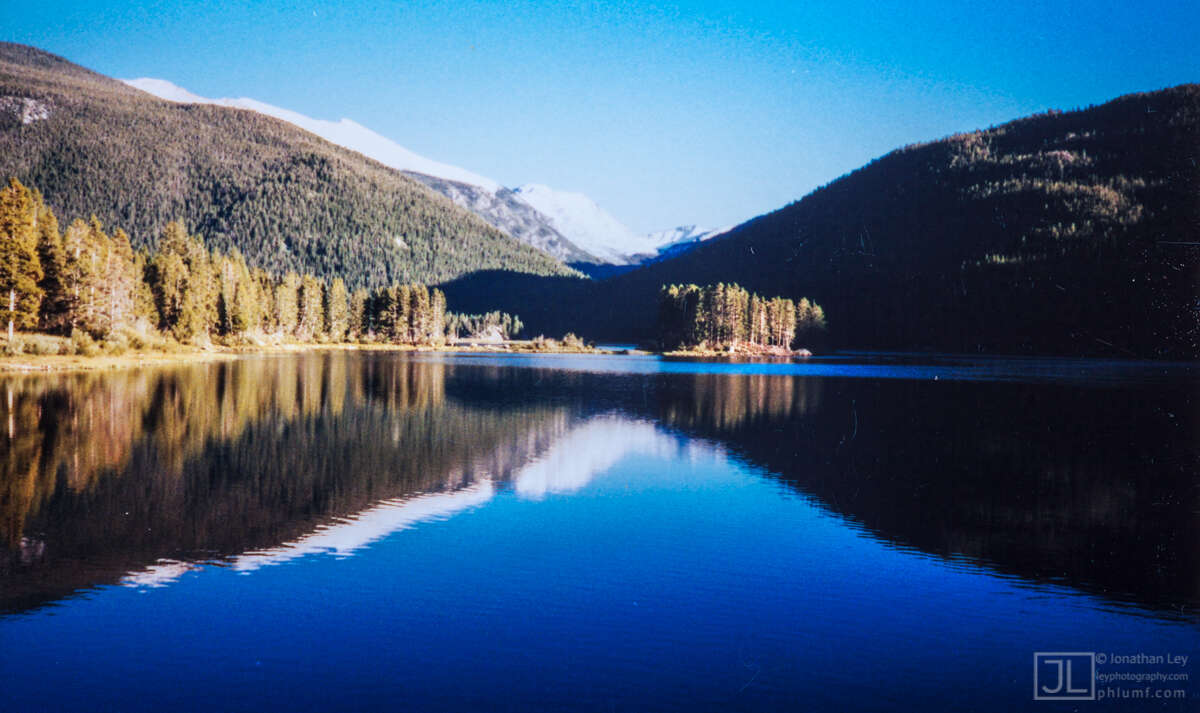
The trail down from the ridge was bad trail. It was in fine shape… even rather new, but the routing was bureaucratic. It didn’t go where I felt it should have gone, it had no feeling, no soul – it was just a cleared path. The trail dipped and rose, up and down the hillside needlessly, like it was designed by a committee whose agenda had nothing to do with hiking. By the time I reached the car-campground below, I was exhausted and hungry.
The campground was rather empty. A few pickups and trailers were parked here and there, most of them appeared to be hunters. I noticed one large white touring bus – a mansion on wheels. A mat of green plastic grass led to the door, a pile of fresh-cut wood was stacked nearby, potted plants decorated the area. Of course, it was the campground host. The campground hosts kept order at the little transient villages, kept watch as people came and left. Not all car-campgrounds had hosts, those campgrounds that did were usually large and busy. The hosts were usually a retired couple, finally free from the struggle of their younger lives, they were out to see the country, relax, meet people and enjoy whatever remained of their years. I planned to cook at the campground, then hike a few more miles. I thought it’d be nice to sit near the hosts, they were usually interesting people, they usually wanted to know what a fellow like me was up to. Usually.
I plopped my pack down on an unused concrete picnic table and pulled out my cook-pot. As I’d expected, the host came over, a slender man probably in his mid 60’s, probably from someplace like South Dakota. “If you’re gonna be here, that’s twelve dollars”, he said with a smile. “Oh, I’m just stopping to cook, then I’m going to hike on a few more miles”. He persisted, “Well, that’s twelve dollars.” I explained myself again. Explained that I did not intend to camp there, simply sit for a few moments. “If you’re going to be here, you have to pay.” He didn’t seem to understand. “Well, I could just as easily sit on a rock over there,” I pointed to a rock a hundred feet away, just outside the campground, “but I thought it’d be nice to meet you, that’s all.” “Well, you have to pay twelve dollars, that’s the rules.”. I couldn’t believe the guy. Twelve dollars for what? There was nothing about the campground worth 1 penny to me. I understood that it cost money to build and maintain the place, but it was built and maintained for cars, not for me. I didn’t need a parking lot, didn’t really even want one, I would have been satisfied if the trail had never crossed through the place. The rules of commerce were intruding into my domain. Those rules didn’t belong and I didn’t like it. I broke.
All those little bits of frustration and anger that had been helping me climb the hills, all those dark cynical thoughts about the ignorance and stupidity of society, all that stuff came pouring out of my mouth. I let loose a flurry of insults and four-letter words I’d never before had the courage or clarity to utter. The man represented everything that was wrong about everything, and I let him know it. “The world would be better off, if people like you weren’t in it”, I raged, “What, do you have? maybe 5 or 10 years left? You probably haven’t done anything with your life except follow rules. That’s pretty damn pathetic, pretty forgettable.” I jammed my things back in my pack and continued my tirade. I made sure it was heard by anyone who cared to hear it. The man just stood there, quiet, probably going it over in his head… “it’s $12, that’s the rule, if I make an exception, that would be stealing, this guy is a bad person, I am good, I follow the rules”.
By the time I left, I was shaking. What had just happened? I felt like I’d just exorcised some demon from my soul and was just starting to feel what it was like to be me, to be free. I felt great. I had no anger left in me. I’d left it all behind. I felt I could smile through anything, I had nothing more to prove to people, nothing more to say, it was all gone. I sat down on a rock a quarter mile from the campground and cooked my noodles. $12 for a concrete bench? I thought about the absurdity of it and laughed.
I hiked another 4 miles in the evening, some of it up a steep hill. As I climbed, I realized I didn’t need angry thoughts to power me, my legs were enough. My head was absolutely clear. I camped a few yards off the trail, where somebody had made a fire-ring. They’d left it there, probably in the belief that they were doing somebody a favor… like every bit of work a man did was somehow good. It was just a bunch of blackened rocks, garbage as I saw it. I scattered the rocks and buried the ashes, it was clean again, natural and proper.
The morning was cool and clear. The trail rose up to a high forested plateau. As I got higher, the snow on the trail got deeper. There were footprints in it though. Brian was up there somewhere, probably a few days ahead already. It looked like he’d come through just after the snow had fallen. The trail finally rose above the trees, a little more climbing and I was back with the pikas and falcons, back on the divide.
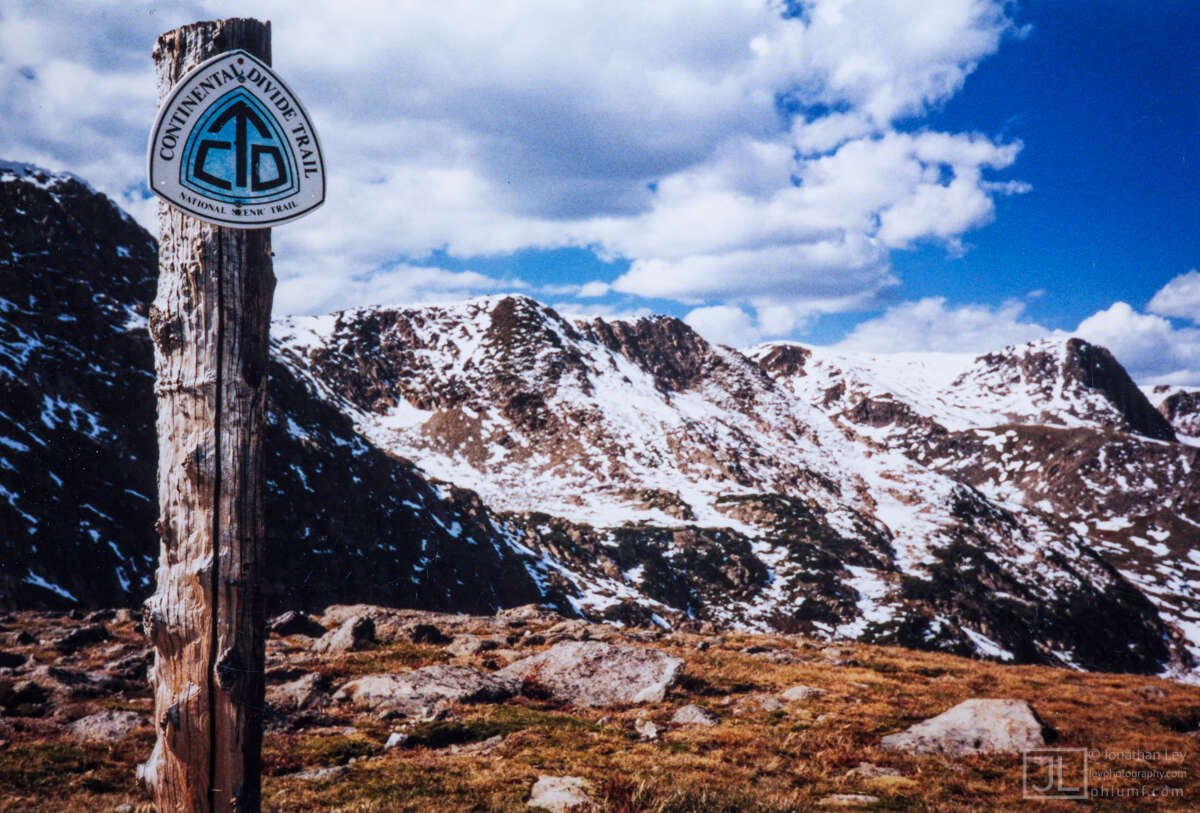
The divide was comprised of steep rolling mountaintops. Cliffs dropped off to the sides occasionally. The ground underfoot was mostly small lichen-covered rocks and 2-inch tall hardy plants. The wind blew continuously – completely unobstructed. The trail faded in and out of existence, faded in and out of crusted snow drifts and piles of larger bare rock. There were occasional trail markers, but it mattered little, the way was obvious – just follow the divide. The views were forever, mountains everywhere in the distance, giant valleys below. The scale of the land was awesome.
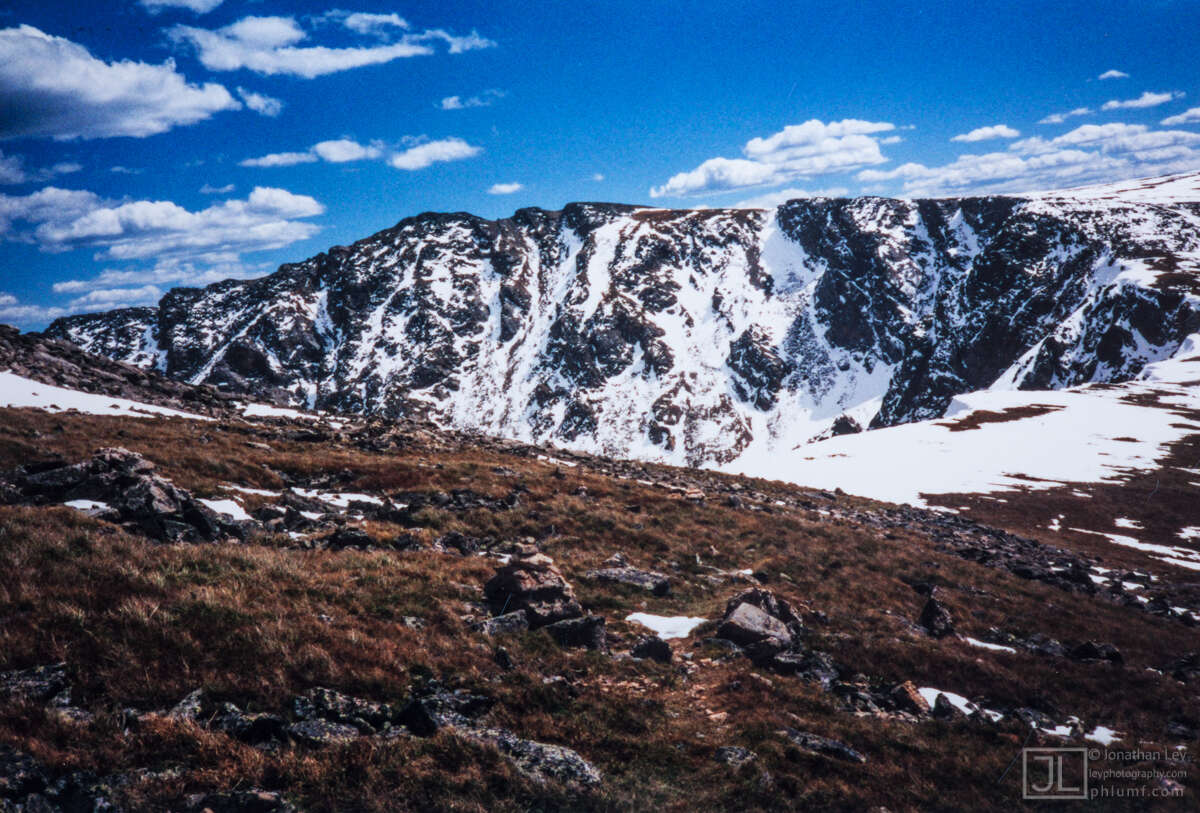
By early evening, I was spent. A combination of the altitude, wind, hunger, the strain of climbing, and information overload from all the views had drained my energy. I wasn’t upset or concerned about it though, I just decided to stop a little earlier than usual. I scooped some snow from a nearby drift and got to work building a wind-break. Like so many things I did, I couldn’t stop once I’d started… just one more block of snow… no, another. After 20 minutes, I had a wall about 3 feet high and 10 feet long. I was proud of my ingenuity. Of course, once the sun set, the wind stopped. As the sky got dark, the wind came from the other direction. I shook my head and laughed.
Far below, to the distant east, Denver glew like a shimmering stain in the blackness. What’s going on down there, I wondered? I didn’t really want an answer though, I was content to be clueless about it all.
I quietly packed my things and continued along the divide in the morning. I powered my way to the top of James Peak. The other side of James Peak led down to a steep pile of rocks. Any hint of a trail was gone. The only way through was to hop from snowy rock to snowy rock. It was a maze with few clues. Any wrong turns led to quick dead-ends – free-falls of hundreds of feet. The view of a tiny road, 5000 feet below made the place seem even more intimidating that it was. There were plenty of more difficult routes in the mountains, it was nothing, not even worth a special note. I realized I had a hard time understanding just what was difficult anymore. Was it dangerous? Had I hiked a long way? Nothing comparative held any meaning.
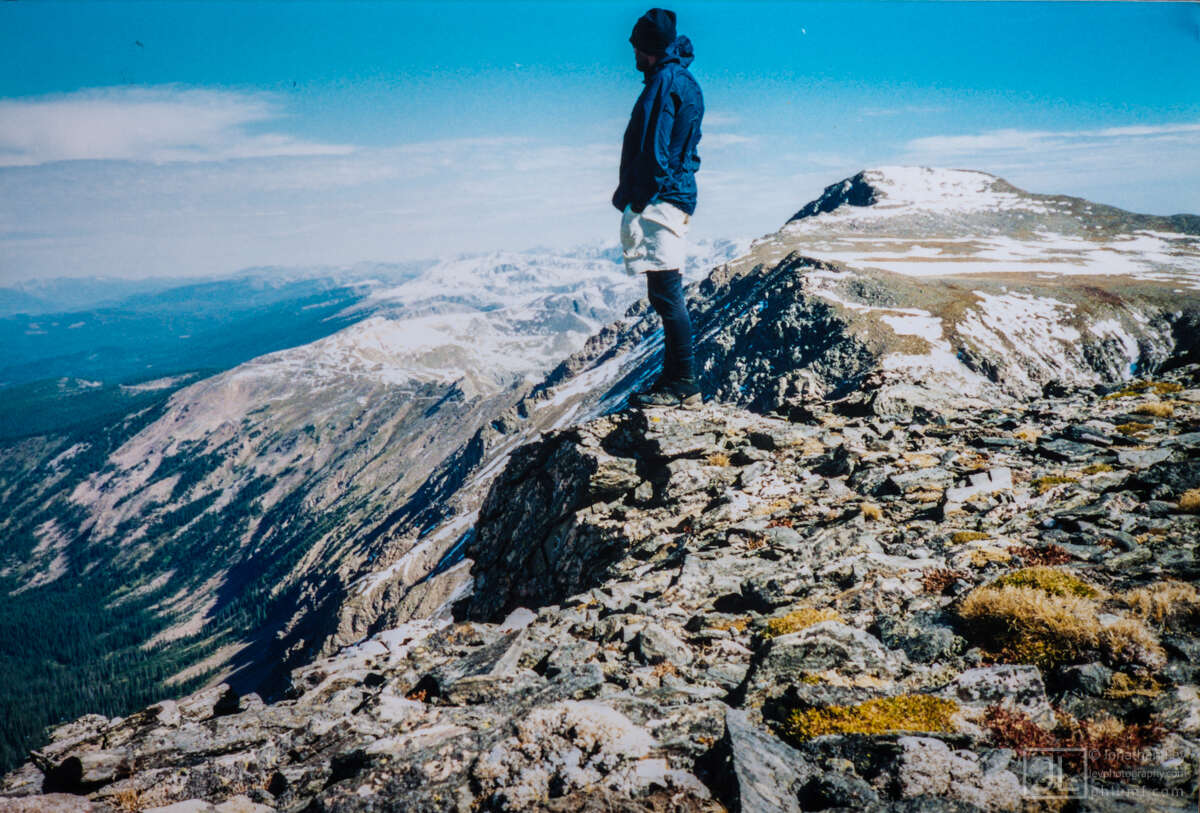
My foot again landed back on solid terrain, in the middle of a footprint in the snow – the ghost of Brian again. There was little level walking on the divide. The route rose over Parry Peak. There was plenty of trail over 13,000 feet on the CDT, but the top of Parry Peak was the highest part of the official route – 13,391 feet. The next few miles continued in a similar pattern… down to 12,000 feet, back up to 13,000, never level. I melted water from snow drifts. I took breaks, I ripped into my food, it was a time of peace, shared with nothing but the wind.
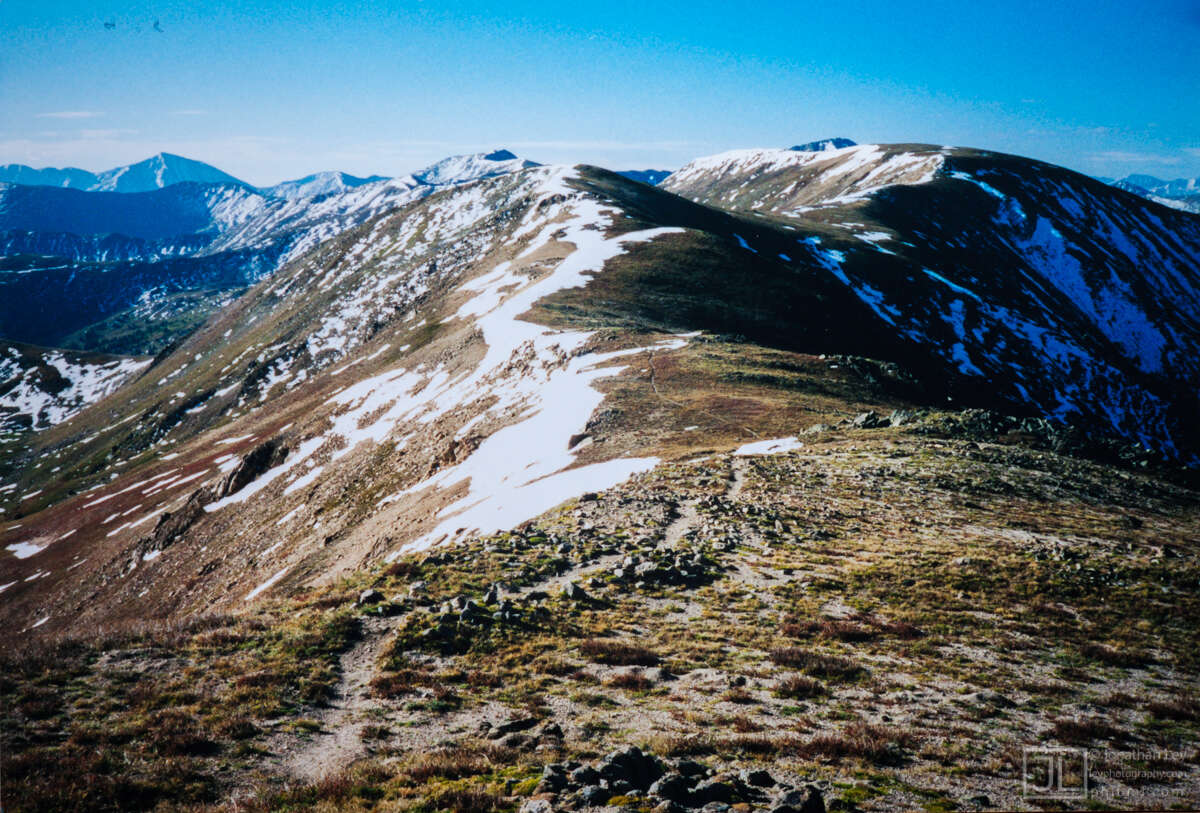
The trail wound down to Berthoud Pass. I raced down a grassy ski slope and into a parking lot – 11,315 ft. It was the top of the road, but the lowest elevation I’d reached all day. A few people milled about, squinting in the sun, pointing, talking quietly, walking slowly. I went inside the ski-lodge, open as a highway rest-stop in the summer. They were selling ski poles, good ones, cheap.
My hiking poles were in sorry shape. The mechanisms which had allowed me to adjust their lengths had long since broken. I had duct-taped the sections to lock them in position. The original tips had worn-off. I had replaced those with pipe-fittings, smashed onto the end (the best thing I could improvise). Those were essentially worn-off too. On the tip of one pole, I had fashioned a hex-nut to give a little extra life. I’d broken the other pole in half after stepping on it. I later spliced the pieces together with a shunt of steel pipe. I was emotionally attached to the poles, I saw them as more than simple tools, they were extensions of my self. They were an extra pair of legs, they were long fingers, I’d held them tight all day, every day, every mile since Canada.
I couldn’t pass up the opportunity though. The new poles were half the weight of the old ones. They even had ergonomic grips! I leaned my old poles up against the wall of the ski-lodge and reassured them they’d be OK. I couldn’t bring myself to just throw them away. Maybe they’d get lucky, and some compassionate person would rescue them, put them on display in a museum somewhere… I hoped they understood.
The divide continued across the road – then straight up of course. After a mile on the ridge, it went back down – very steep. There was no trail on the descent, just a few cairns. I slowly realized that to stray off the path shown by the cairns meant sliding down a cliff. The cliffs there were sneaky, the slope of the mountain got steeper and steeper, eventually giving way to vertical bits of loose rock. I thought, a hiker could have easily walked right down one of those slopes, realizing only too late that they were headed for a free-fall.
The end of the day continued much the same, steep. I made slow progress. Both up and down, my efforts against gravity wore me out. I finally called it a day at the base of yet another climb, 5 miles short of where I’d hoped to be by the end of the day. I looked at the map. I had gone up and down 7400ft of vertical elevation, all of it steep, most of it between 12,000 ft and 13,000 ft. It was the most physically challenging day of the entire trip. I was still far above the trees, the wind rattled my tarp all night, sleep was difficult.
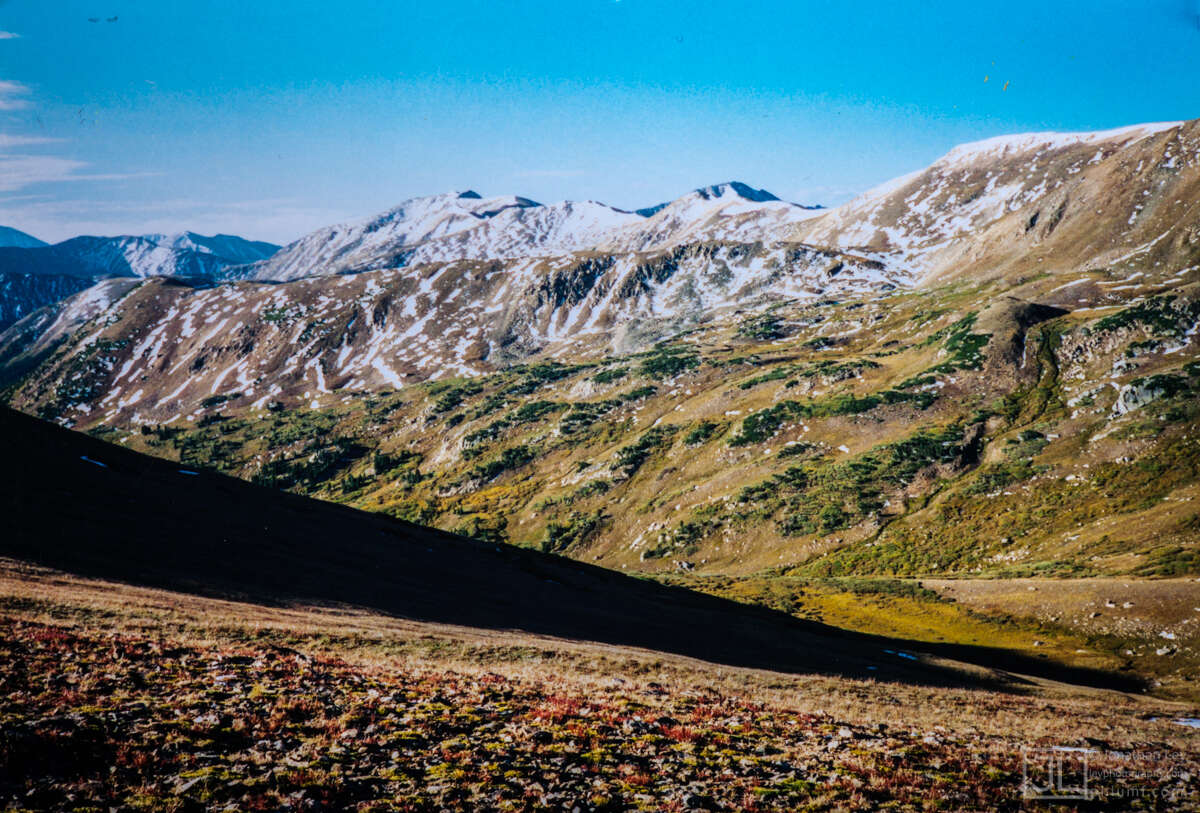
The next morning, I rose over a rippled mountain side, the hues of yellow and brown and green sparkled in the morning light. I stopped every couple minutes, just to look and feel. I knew there was something more I needed to do, something that would make the experience deeper, something that would make me a part of the mountain forever… I couldn’t figure out what it was though, so I just took a photo.
The divide flattened for a short while. I noticed a person sitting on top of the next peak, at least it looked like a person anyway. I hurried, for some reason, anxious. I didn’t know to where the person might have run off, but I didn’t want to take a chance that he would, being up there even with a stranger made it more real – I could look into another person’s eyes, and see my own. The man was crouched near some type of scientific apparatus. “What are you doing?”, I asked. “Oh, just taking some measurements”, the response was vague. I pressed on, “What are you measuring?”. I couldn’t tell if he wanted me to leave, or just thought I wouldn’t understand the technical aspects of what he was doing. After a bit more questioning (and assuring him that I did have a technical education), he told me he was measuring small geological movements with a local positioning system. The mountaintop was a “known location”, and there were other people on other mountaintops, other known locations. They were looking for small movements… millimeters… The mountains in the area were riddled with tunnels and canals, all part of an elaborate water distribution scheme. Small changes in the geology of the area could greatly affect the way water moved from place to place. It seemed odd to me that anyone had even gone through the effort of digging those canals… some were miles long. I wondered why the original design of the earth wasn’t considered good enough.
A few minutes later, I passed by a young couple out for a day-hike. I talked to them for a little while about my hike, about other trails and mountains in the area. “So, did you hear the news?”, the young man asked. “Sure, I get the news every few days, when I get to town…”, “No, the news…”. He proceeded to tell me that someone had crashed planes into the pentagon and world trade center a couple days prior. He also told me that the world trade center had fallen over, and a lot of people had died. The powers that be weren’t sure yet who’d done it or exactly why.
The news was difficult to believe or, if true, digest. The world was going on out there, but I was detached from it. People were dying somewhere, innocent people. But, innocent people died every day, everywhere, all of them died. My trail was still in front of me. The wind still blew the same, same as it had since long before I was at all, and same as it would until some day. Some day, it would stop. Then, there would be another wind, another time, another place. Me? the trail? the mountains? No, just a ghosts in the chaos – organized matter, long scattered and forgotten.
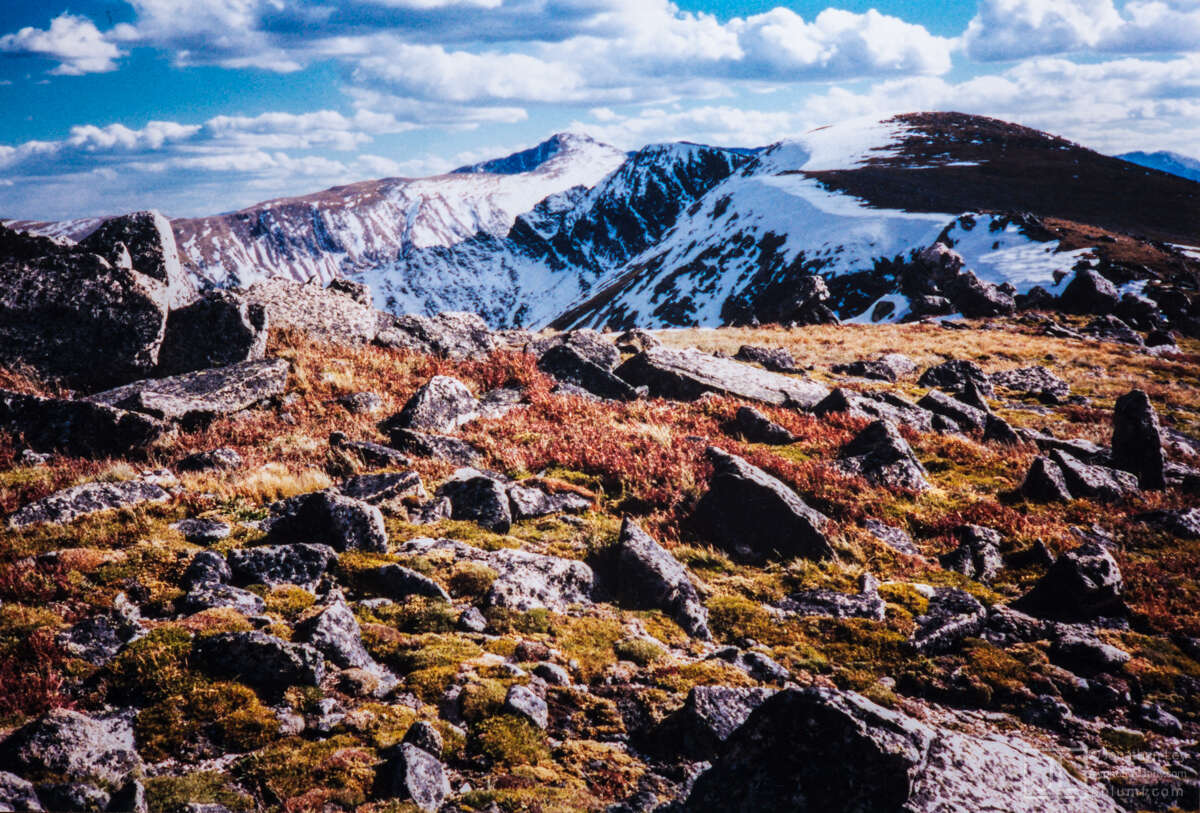
The route took me off the divide again, down to another broad valley, another detour around some cliffs. It was nice to get a different perspective of the divide sometimes. One problem with climbing a mountain was that one didn’t get to see the mountain under one’s feet… at least not from a distance, and it was from a distance that most mountains showed their most awesome sides. That valley, that hike back up to the divide was no exception. A giant 2500 foot cliff face dominated, flecks of white snow still remained on some of the ledges, exposing them from the background of black rock.
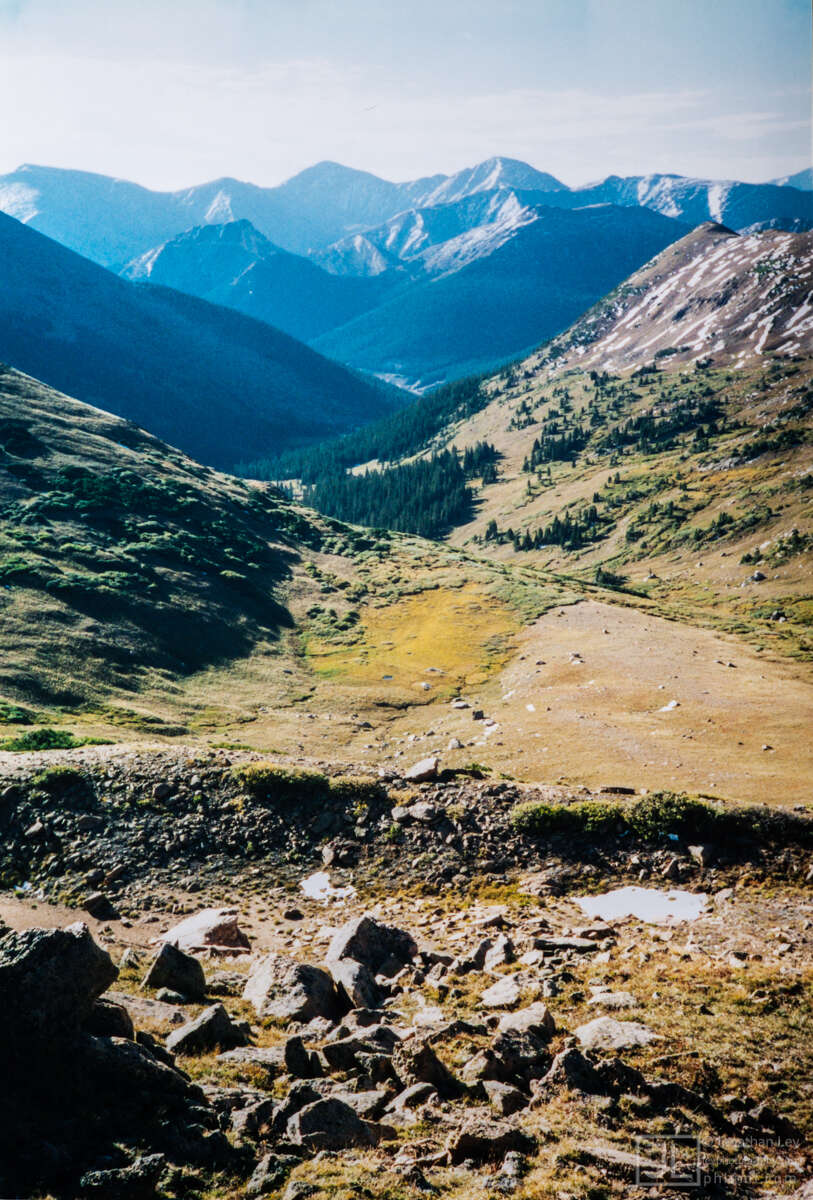
By the time I reached the divide again, the sky had become thick with clouds. I knew it was just a matter of time before it began to rain… possibly snow. In either case, I had lightning to worry about again. I raced over the divide and down another steep slope to pick up the trail again. The path was barely a trail. It seemed more like a wildlife trail – it was only about 6 inches wide, cut across the side of a steep mountain. According to my map, it was indeed the correct path. It looked like it would completely melt into the mountain in a matter of a few more years.
I saw a huge cairn on top of a nearby hill, the trail I assumed. It wasn’t the trail though, just a gigantic monument to human persistence. Apparently, some group of people out there somewhere had a mission to pile a cairn on every mountain in Colorado – even insignificant unnamed hills had cairns. Usually, I didn’t like to see such displays of human tinkering with the landscape, but the cairns in Colorado were important to somebody somewhere, and they had no practical importance. I liked that.
The trail dipped down to another river, then headed back up to the divide. It wasn’t raining yet, I thought perhaps it wouldn’t rain. Then, I walked over the divide and got an entirely new view. The trail dipped down to a gigantic valley, to a gigantic reservoir. Behind the reservoir was a huge triangular pyramid, Peak 1. It was shrouded in a grey cover of rain. Black clouds filled the sky above the peak and behind it. A sprawl of buildings and roads was down in the bottom of the valley, my goal.
I had only a couple miles to walk in the exposed alpine zone, after that, the trail dipped into the trees. I hurried along the trail as the clouds moved closer and the sky above me darkened. I ran down the trail – vaulting with my hiking poles. With one mile to go, a bolt of lightning smashed into a hill just to my left, a hill exactly like the one I was on. I had to go down, off the trail, into the woods below. I continued running as the slope of the mountain steepened. I couldn’t stop, I could barely avoid speeding up. The ground was far from level – it was bumpy and covered in knee-high grass. I kept running uncontrollably. I just knew that I was going to break my ankle or leg, just knew it. Instead, I broke the chest harness on my pack. I finally reached the trees just as the rain clamped down.
It was a thick and heavy rain, not one of those storms I could wait-out. But I didn’t care, I was going to town, I could afford to get wet. I set off, through the woods, around the mountain, looking for the trail. I came upon a strange scene. A mess of camping gear lay scattered about in a clearing in the woods. Plastic coolers, metal pots and pans, a nice camp-stove, clothing of various types… it looked like a bomb had gone off – nothing was standing in an upright position, the coolers were smashed, the pots and pans laid in the grass, collecting raindrops. All of the things looked new. I wondered what had caused the catastrophe, it was somebody’s stuff, why had they just left it there? I figured the people must have left camp for some kind of emergency, and then bears had destroyed whatever remained. There was a story there somewhere, but one that required more detective work than I cared to invest.
I found a trail. Not “the” trail, but one that was on my soggy map, it appeared to intersect the CDT ahead. As long as I headed downhill, I figured, I had to come out somewhere near town… The rain seemed to intensify as I walked down the mountain. I came to a small horse pen. Five or six wet horses stared at me as I entered their enclosure. As I opened the gate to leave the other side, they approached, perhaps curious to know “how I did that”. They wanted to go free, I could see it. Perhaps they wanted to roam the desert of the Great Divide Basin, perhaps it was better that they didn’t know about it. I locked the gate behind me, and walked past the nice homes, the homes that were at the end of the road – the ones that had a view. I crossed under the freeway and found myself in a sprawl of cookie-cutter town-homes. I was desperate to get out of the rain, to get inside somewhere. I couldn’t see any places of business though, just building after drab rectangular building, all numbered in sequence. I ducked under the covered porch of one of the buildings. I was out of the rain, but dripping and getting cold. I fumbled and dropped my camera on the concrete. I figured I’d probably broken it, but I didn’t have time to worry about that. I had planned to meet my girlfriend somewhere in town, but I didn’t know where. I needed to make a phone call, I needed a phone, any phone. I took off my drenched pack and knocked on the door next to me. They’d understand, I thought… And if they didn’t, I’d be no worse off.
The man who answered the door spoke Spanish, which would not have been a problem if I spoke Spanish too. He did speak a little English, but not enough to understand my complicated story, “I just walked down the mountain…”, I said, pointing up. I managed to get across the facts that I was very wet and cold, I needed to make a phone call, and I had a phone card. He let me use his phone, but I couldn’t get a hold of anybody. Oh well. I put my poncho on and headed back down the road, toward the center of the sprawl. A couple miles later, I found myself at a laundromat – drying off.
I spent the next couple hours at a pizza place, devouring a large greasy pie and watching “the news” on a TV. I finally walked over to a hostel, a cheap night’s rest. I felt disorganized and lost, my thoughts were scattered.
Silverthorne, Dillion, East Dillon and Frisco comprised one giant suburb that had no city. The layout of the buildings was designed to be convenient for people who drove cars – big parking lots, wide roads and big spaces between everything. I hated walking across towns – a mile to the post office, a mile the other way to the laundromat… I was walking through a parking lot when I heard a voice from over my shoulder, “Hey! are you hiking the CDT?”. I young man I’d never met or seen came walking over.
His name was Tay. He and his girlfriend Paulie were hiking the CDT too. They had both hiked the PCT in 1999 but I hadn’t met them then. “We’re actually in Steamboat”, he explained. They’d gotten a ride to Silverthorne from Paulie’s father… for reasons I never heard. I was excited to meet some other hikers – it was a rare treat on the CDT, but our meeting was short-lived. They were in a rush to get back to Steamboat, “gotta get through Colorado before the snow hits!”. It was a concern of mine too.
Later that day, I met up with Deirdre. We spent the night at a car-campground near the reservoir. We watched a couple beavers slap their tails on the water as another day ended. I had never seen a beaver before.
Deirdre and I left the next morning, she was going to join me just for a day, then loop back to her car on another trail.